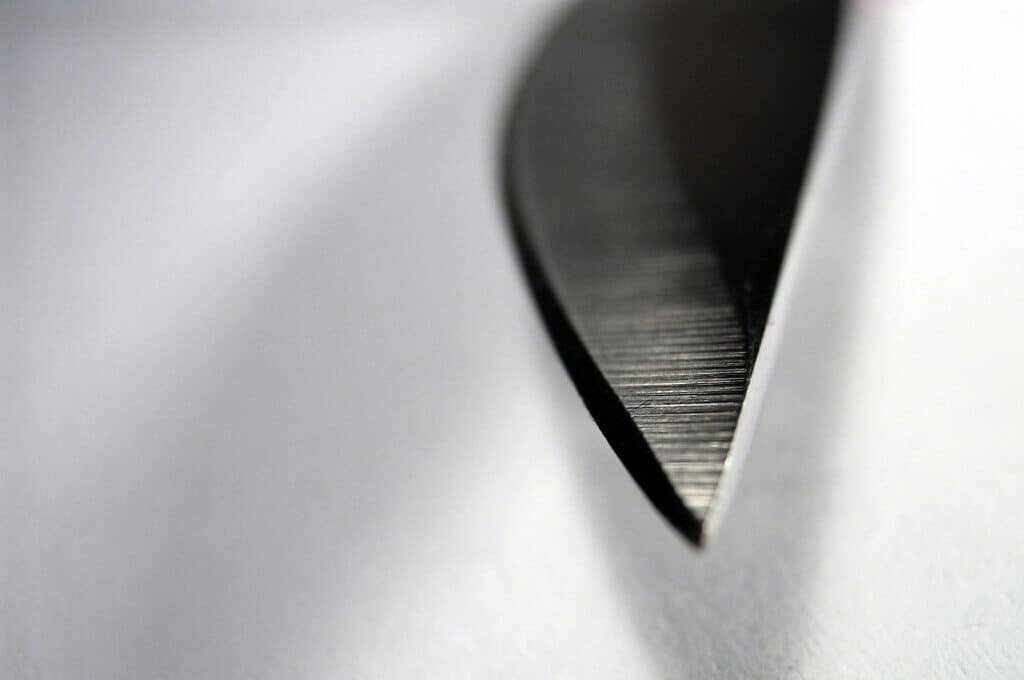No matter how hard he tried, the kid couldn’t shake the image. He couldn’t recall when it first appeared, or where it had come from, but whenever he rode in the car, no matter where he went, he imagined a long blade extending from the vehicle—maybe he held it, maybe it was attached like some kind of Mad Max accouterment—but regardless it mowed down everything along the road, the fences and the light poles, the tall ears of corn, other cars and bikers, the diners and the motels. Everything in its way this blade knocked down, cut through, shaved in half. It was sometimes an extension of his arm which, as his father drove, hung out the window riding the curvature of the wind with him, cutting, cutting, cutting.
The violence didn’t bother him; it was the incessant presence, his inability to un-imagine this long knife once it had been conjured. Sure, every once in a while he’d forget, maybe make it to the store and back preoccupied enough that it didn’t appear, but if he was in the car long enough, it surfaced, suddenly was there, reaching out as far as 50 feet from the car window, slicing through the world as if it were made of paper.
He remembered his father’s cars with physical specificity: a gold 1968 Chevy Malibu with a spot of rust just above the driver’s side headlamp, and a split across the passenger seat upholstery he could sometimes still feel; a blue 1975 Buick LeSabre that hiccupped at speeds over 60 and was totaled in an accident in which his grandmother was killed; a white 1980 Toyota Camry with a moon roof, the first car he had post-divorce, which ran like hell with a constant rattle underneath and loose back seats he never got around to fixing.
But the cars didn’t matter. It could have been his uncle’s pickup truck or his friend Willis’s van; he couldn’t ride on a road without being haunted by that scythe, that urge or whatever it was in his psyche, to mow the passing landscape down with an easy swing at any speed. He would think, much as he would about jacking off, that this would fade with time, that as he aged the need or the obsession would lessen, naturally, that he’d be able to enjoy a car ride or a landscape without his mind seeking to destroy it. This failed to happen, at least entirely.
He will be driving along—he now drives a grey, pearlescent Subaru WRX—when suddenly a thought can trigger it, like a switchblade. Maybe he remembers dinner, maybe it’s a thought of Laura, the only woman he thinks has ever truly known him, and where she is now 20 years on; maybe it’s his dad, who should have kept living, but whose stubborn insistence on non-invasive treatments meant a slow, however fast, fade into painkiller-filled oblivion; maybe it’s his boss, or the one before that, his hair-trigger sense that he’s always on the verge of being disciplined; maybe it’s a thirst for a Diet Coke and a remembrance of the old Coke bottles they’d open with their gun butts before draining them for targets; maybe it’s a recurring idle curiosity about the lives of women in burkas, or the knowledge that someone somewhere is being blown up in a car bomb, stabbed, robbed, born. He had read once that the car in a dream symbolizes the extended, out-stretched self, an image of one’s best self projected in motion (his dream car: a red Maserati Spyder convertible), an emblem of how we think we are or how we want to be seen. A knife, well, that’s easy.
–
John Estes directs the creative writing program at Malone University in Canton, Ohio, and is on the faculty of Ashland University’s low-residency MFA. He is the author of Kingdom Come (C&R Press, 2011) and two chapbooks: Breakfast with Blake at the Laocoön (Finishing Line Press, 2007) and Swerve, which won a 2008 National Chapbook Fellowship from the Poetry Society of America.
Lead image: “Knife atcha” (via Flickr user Mattias)


So relieved to find a story well written, with great detail, that doesn’t talk about a break up or cancer.
I quit reading most memoirs for the exact same reason. I know of only two cheery memoirs, my book of poetry and a book by Lilibet Snellings, “Box Girl”. Even my teenage students like books about dying and/or psychological breakdowns, at least the girls do.
Love the obsession of this, the writing sticking to it….